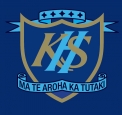Kaiapoi High School
| Kaiapoi High School | |
|---|---|
 |
|
| Address | |
| 85 Ohoka Road Kaiapoi 7630 New Zealand |
|
| Coordinates | 43°23′16″S 172°38′45″E / 43.3879°S 172.6458°ECoordinates: 43°23′16″S 172°38′45″E / 43.3879°S 172.6458°E |
| Information | |
| Funding type | State |
| Motto | Ma Te Aroha Ka Tutaki (Through caring, concern and support for others, all things are possible) |
| Opened | February 1972 |
| Ministry of Education Institution no. | 314 |
| Principal | Bruce Kearney |
| Years offered | 9–13 |
| Gender | Co-educational |
| School roll | 878(February 2017) |
| Socio-economic decile | 7O |
| Website | www |
Kaiapoi High School is a state co-educational secondary school located in Kaiapoi, in the Waimakariri District of New Zealand's South Island. The school serves 878 students from Years 9 to 13 (approx. ages 12 to 18) as of February 2017.
The school opened in February 1972 as the Waimakariri District's second secondary school, supplementing Rangiora High School 11 km away in Rangiora. Like many New Zealand state secondary schools built in the 1970s, Kaiapoi High School was built to the S68 standard design, characterised by single-storey classroom blocks of masonry construction, low-pitched roofs with protruding clerestory windows, and internal open courtyards. Other schools using this design in the wider Canterbury area include Hornby High School and Ashburton College.
Kaiapoi High School serves the coastal Waimakariri District, including the towns of Kaiapoi, Woodend, Pegasus, Waikuku, and the surrounding rural area west to Swannanoa. It also serves the rural northeastern part of Christchurch City as far south as the Styx River, including Kainga, Brooklands, Spencerville.
At the April 2014 Education Review Office (ERO) review of the school, Kaiapoi High School had 587 students, including 24 international students. There were slightly more male students (51%) than female students. 79% of students identified as New Zealand European (Pākehā), 14% identified as Māori, and 7% identified as another ethnicity.
Kaiapoi High School has a socio-economic decile of 7 (funding step O), meaning it draws its school community from areas of moderately-low socio-economic disadvantage when compared to other New Zealand schools. This changed from decile 5 (funding step M) at the beginning of 2015, as part of the nationwide review of deciles following the following the 2013 census.
...
Wikipedia
